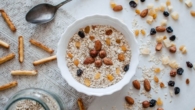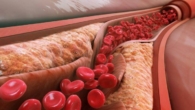
Scientists have told how not to get diabetes
1
The incidence of diabetes is constantly increasing, and in in some countries it even takes on the character of an epidemic. This pathology leads to serious health problems and even death. However, diabetes can be prevented or successfully controlled by making small lifestyle changes.
Experts agree that diabetes has already become an epidemic in America. Contrary to popular belief, diabetes is not an inborn disease, and it is not just about high blood sugar. Diabetes damages blood vessels, heart, brain and blood circulation. It is a disabling disease that can be fatal.
Currently, the number of cases of type 2 diabetes, which is directly related to diet and lifestyle, is rapidly increasing. That's how most people get diabetes, which is actually something we can completely control. Below we will tell you more about diabetes so that you can preserve your health and the health of your loved ones.
What is diabetes?
Diabetes is the inability of the body to process sugar (glucose). When a healthy person eats sugar, the pancreas produces a hormone called insulin, which converts the sugar into energy. In a person suffering from diabetes, either the pancreas does not produce insulin at all, or the body has resistance to this hormone.
As a result, sugar accumulates in the blood vessels. This, in turn, increases the risk of developing serious medical complications, such as heart disease, dementia, blindness, poor circulation, which can sometimes result in limb amputation.
That's why most people get diabetes
According to experts, the most important risk factor for developing type 2 diabetes is a diet high in added sugar and processed foods. (The body does not see any difference between them: processed food quickly turns into sugar.) When a large amount of sugar is constantly present in the body, the sensitivity of insulin-dependent cells to the action of this hormone decreases.
The results of the study indicate a direct relationship between the consumption of deeply processed foods (for example, chicken nuggets, sugary cereals, frozen lunches) and an increased risk of developing diabetes.
Scientists followed 100,000 people for six years and found that those who ate the most processed foods (about 22% of the daily diet) had a significantly increased risk of developing diabetes compared to those who ate such foods less frequently (less than 11% of the daily diet).
Scientists obtained these data even after adjusting for other serious risk factors: excess weight and lack of physical activity. With a 10% increase in the consumption of deeply processed foods, the risk of developing diabetes increased by 15%.
A habit that must be abandoned immediately
It's extremely important to cut back on drinks with added sugar, such as sugary sodas, right now. “Drinking beverages with added sugar is often associated with weight gain, obesity, type 2 diabetes, heart disease, kidney disease, nonalcoholic fatty liver disease, tooth decay, and gout,” the Centers for Disease Control and Prevention reports.
A simple way to reduce the risk of developing diabetes
A diet rich in fruits and vegetables, whole grains, lean protein (especially fatty fish such as salmon) and healthy fats (avocados, nuts and olive oil) can reduce your risk of developing diabetes and other chronic diseases such as heart disease and cancer.
One of the types of such a diet is the Mediterranean diet. The review data show that “there is evidence of an inverse relationship between adherence to the Mediterranean diet and the incidence of type 2 diabetes”.
Another important risk-reducing factor
To reduce the risk of developing type 2 diabetes or to successfully control its course, it is very important to exercise regularly. Exercise makes muscles more sensitive to insulin and helps the body better regulate insulin levels. Even moderate activity, such as walking, can help significantly.
One study conducted by the National Institutes of Health found that 30 minutes of low-intensity physical activity (such as walking) daily in combination with a low-fat diet reduces the risk of developing type 2 diabetes by 58%.









Leave a Reply